Daniel Radcliffe. Daniel, Daniel, Daniel... I must confess to not being the world's biggest fan of the repugnant, bug-eyed little creep. The
Harry Potter films didn't exactly endear him to the human race, but that infamous Jonathan Ross interview marked him out as a big-time tosser and general pus-bucket to be kicked back and forth. Was he on drugs? It struck me as a reasonable question! Dear me, he did everything but jump up and down on the sofa and assault Ophra Winfrey whilst proclaiming his newfound passion for Katie Holmes. So I was naturally prejudiced, embittered, twisted, hopelessly lost,
et al., before the play even begun.
He was
all right. It was all very mechanical really - insistent and determined, yet not in the style of a smooth clockwork engine. Here one could see the wheels chugging round. It was polished and marvellously well-rehearsed, but simply not in the manner of the great acting that such a part demands. I entered that theatre seeking inspiration and enlightenment, but instead found my holy candle abruptly, rudely snuffed out.
Lord, doesn't that sound bitchy? I must apologise to the poor, luminously successful sod and attempt to restrain myself. I'll try to restrain any cynical or bitter spoutings for the meantime(as fun as they are to write!), whilst attempt to thoroughly dissect and explain my explicit outrage with this situation.
To be quite honest, I left that theatre incredibly annoyed with myself at having virtually nothing to say about him. That's never a good sign. But still, it crushed me. It must have made me look awed or impressed to my seemingly endless outpourings of consternation, when it really wasn't that at all. More a sort of hollow dissatisfaction and ongoing feeling of injustice.
What is this hate campaign all about? I'd disagree that this is really about Mr. Radcliffe. It's probably more a case of my projecting my own strengths and weaknesses as an actor onto somebody else entirely giving the performance I would never once consider in a role I'd be (to understate) brutally unsuited for in the first place. Does that make any sense? If not, read again. Over and over through that insipid performance I found myself playing about in my head with this and that, mentally reshaping the way that
I'd have done it. Things like:
"Nope, he's got the intonation all
wrong there. This isn't television."
"That's a meaningful line! A keystone, as it were! Don't throw it away!"
"He may be naked, but he still isn't radiating the right level of anguish. Couldn't turn up the intensity a few notches could you, old bean?"
"Why are you still shouting?
Why!? That's not right at all."
"I think it's much better if you spit the swear words. That had very little in the way of shock impact. We're so much more jaded than you think..."
"He's gyrating, I suppose. But I'd have gyrated
so much more dramatically."
Yes, all that nauseating drivel. Petty little mental squabbles. Is there anything more foul than actors congregating to discuss the dreaded words "interpretation" and "technique"? Or indeed, exchange notes? And I'll tell you why: it's the effort of another individual to stamp their own personality in place of your own. Their own ideology, their own philosophy, their own ticks and quirks, their own little flaws and past traumas, their - their own
life, in short. It's more than a little bit unhealthy and unseemly.
The creative arts are interesting that way. They offer a window into the person beneath the facade they normally strive to project - singing, dancing, music, painting, baking a particularly influential cake, whatever you like. Acting? Sorry, but you can't very well say, "Oh, that's not me - that's just the
character." I think you'd find it bloody difficult to be that mere character in any capacity unless it already existed inside you. As Edith Evans used to say, "I guess I just have a lot of people living inside me." It remains a compelling fragment of your life experience and soul. It's interesting how much you can tell from a person by observing their acting - are they frenetic and charged with manic energy? Are they solid and dependable like a pair of well-worn shoes? Do they crackle with anger and searing angst? Or is there an inner sadness welling up from deep inside? We all act in everyday life, after all. We all put up a front. With a few minor alterations, this theory can apply to most any expression of creativity, whether it's singing in the shower to defacing a bus shelter with yellow paint.
Mind you, this theory only seems to work among genuinely good actors. Good actors tend to be very interesting people, whether we realise it or not. And all this murky, multi-layered psychobabble brings me back to the matter of Daniel Radcliffe.
I simply don't feel convinced that he's been living properly. No no, I'm not insinuating that he retires to a cardboard box on an evening to lick crusted, week-old cheese off the insides (although, each to his own). Quite the opposite, if rumours are to be believed. If he's to stand a chance in such a competitive, cutthroat industry, the enterprising boy wizard must first go out and live his life and, in time, becoming genuinely
interesting in his own right. As it is, he's rotting away on a film set week after week churning out uninspired hackwork, producing a feeble
imitation of an imitation of life. What really boils my blood is how complacent he feels about it all as well. Hasn't he ever sat down and thought about the dreadful curse he's inflicting upon impressionable children? Ushering in a fresh generation of pretentious, self-obsessed show-offs and narcissists, all swishy style and no substance, all I-Can't-Believe-It's-Not-Butter and no bread (cast your thoughts back to Manor C.E. School, and I'm sure some of you will make the connection...) who aspire to be like him!
At least stop referring to yoursleves as actors. You just demean anyone who gives half a damn about advancing an ancient, noble artform. Talent is a privelige, not a right, and it can be earned through insistent effort and labour. Nothing can redeem flabbiness of thought and character in motion.
Back on topic, outrage ended, who knows? There
could be a good actor lurking in the wings, still primed to pop out and give us all the shock of a lifetime. But Lord knows, the poor sod's not going to get the chance to show it to us. It doesn't exist at the moment - he just isn't an interesting individual, and it surfaces in his acting. Such is the sad fate of all child "actors." Any remotely successful actor goes out into the wider world before bringing their unique, diverse experiences to the theatrical table. Boris Karloff was 44 by the time of his big break, but he made history and made it exceedingly well. Daniel Radcliffe is going to flare like a November firework, burn beyond recognition and then vanish into the night.
Bah. It's no good sitting in a dark corner justifying mediocrity's place in the universe. You've got to get out there and flush it off the stage through whatever skills and insights you can muster. If the public wants to be blown away by Daniel Radcliffe, there's little to argue with. You can't very well call the thronging masses that will later make or break so many hardworking and so many lazy people
wrong. You've just got to raise the bar a little and exceed all expectations.
"And, God-willing, we'll live to see that day, Watson..."
 Picture
Picture  Robert Mitchum is the most distinguished of screen psychopaths in the part of preacher-cum-bluebeard Harry Powell. At the audition, Charles Laughton was elated when the actor replied to his summary of the character as “a diabolical shit” by saying “present!” Despite a very bleak and worldly-wise view of acting as utterly pretentious and completely useless (not a bad line of thought), he leaves a supremely powerful mark in the role, combining a lustrous, baleful stare, disarming Southern accent and bouts of manic intensity to chilling effect. The character ranked a worthy #29 on AFI’s 100 Years of Greatest Heroes and Villains, and earned Mitchum another iconic madman's role in
Robert Mitchum is the most distinguished of screen psychopaths in the part of preacher-cum-bluebeard Harry Powell. At the audition, Charles Laughton was elated when the actor replied to his summary of the character as “a diabolical shit” by saying “present!” Despite a very bleak and worldly-wise view of acting as utterly pretentious and completely useless (not a bad line of thought), he leaves a supremely powerful mark in the role, combining a lustrous, baleful stare, disarming Southern accent and bouts of manic intensity to chilling effect. The character ranked a worthy #29 on AFI’s 100 Years of Greatest Heroes and Villains, and earned Mitchum another iconic madman's role in 
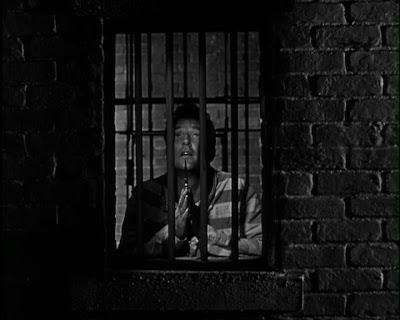 A life watching old horror films warns you to beware of the child actor, and, if necessary, avoid it like the plague (case in point: Donnie Dunagan in
A life watching old horror films warns you to beware of the child actor, and, if necessary, avoid it like the plague (case in point: Donnie Dunagan in  Shelley Winters is the gullible widow gradually more unhinged by the collapse of her life. When she marries Powell, the repressed Preacher refuses to consummate the marriage (he prefers using his knife to dispatch unwanted sexual energies) in a remarkably daring and frank vignette, especially for 1955.
Shelley Winters is the gullible widow gradually more unhinged by the collapse of her life. When she marries Powell, the repressed Preacher refuses to consummate the marriage (he prefers using his knife to dispatch unwanted sexual energies) in a remarkably daring and frank vignette, especially for 1955. It’s also interesting to see the onslaught of religion in her life drive her insane with faith - an interesting bit of moral commentary, perhaps even more relevant with today’s bloodcurdling abuse of Christian dogma.
It’s also interesting to see the onslaught of religion in her life drive her insane with faith - an interesting bit of moral commentary, perhaps even more relevant with today’s bloodcurdling abuse of Christian dogma.
 She’s evolved into an iconic figure approximating the Virgin Mary by the time of her climactic stabbing, pale as a ghost in bed as the light from the window draws an elegant white coffin around her.
She’s evolved into an iconic figure approximating the Virgin Mary by the time of her climactic stabbing, pale as a ghost in bed as the light from the window draws an elegant white coffin around her.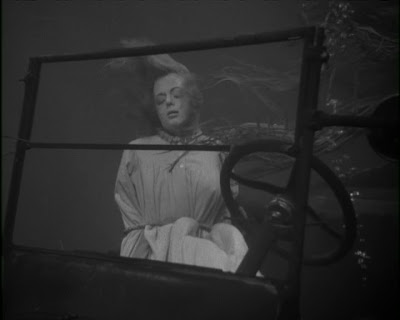 Lillian Gish features in a supremely odd star cameo as the deeply religious saviour of the children, one of those tough, matronly old birds so beloved by American filmmakers. It’s odd because she doesn’t appear (narrative-wise, at least) until we’re over two-thirds into the picture’s runtime. It’s this sort of blistering decision on the part of the screenwriter that adds that palpable extra aura of realism and believability to what might simply be a showy diva’s role (thank goodness they didn't get Bette Davis). It’s a touching, beautiful bit of acting, and she makes for a powerful contrast to the warped spiritual outlook of the rest of the cast.
Lillian Gish features in a supremely odd star cameo as the deeply religious saviour of the children, one of those tough, matronly old birds so beloved by American filmmakers. It’s odd because she doesn’t appear (narrative-wise, at least) until we’re over two-thirds into the picture’s runtime. It’s this sort of blistering decision on the part of the screenwriter that adds that palpable extra aura of realism and believability to what might simply be a showy diva’s role (thank goodness they didn't get Bette Davis). It’s a touching, beautiful bit of acting, and she makes for a powerful contrast to the warped spiritual outlook of the rest of the cast.
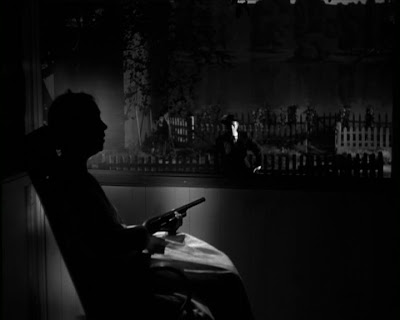 Why is the horror genre so obsessed with cellars? The darkness, the gloom? The austere absence of human life? Their bilious Freudian connotations, so lovingly deployed by Roger Corman in
Why is the horror genre so obsessed with cellars? The darkness, the gloom? The austere absence of human life? Their bilious Freudian connotations, so lovingly deployed by Roger Corman in 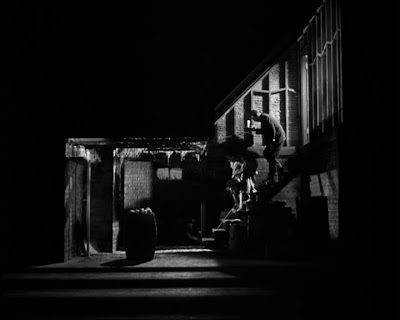 Memorable cellar moments from the golden age of horror include Bela Lugosi skinning Boris Karloff alive in
Memorable cellar moments from the golden age of horror include Bela Lugosi skinning Boris Karloff alive in 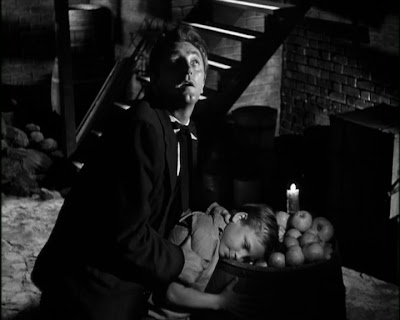
 Perhaps what elevates
Perhaps what elevates 






